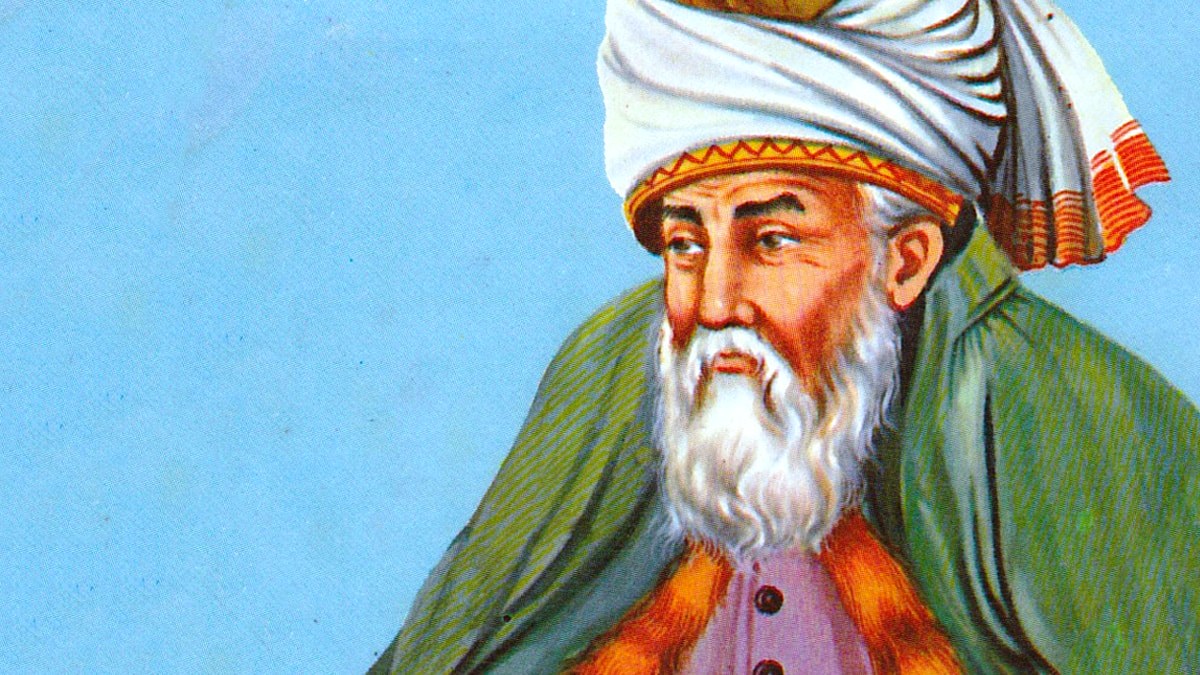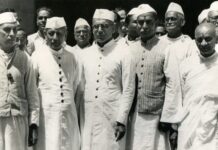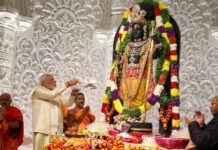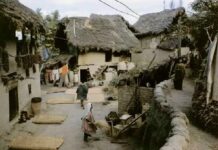A God forsaken country, located deep into Himalayas, Kashmir would play host to anybody and everybody. Criminals, deserters, rebels and preachers – people with diverse backgrounds would come and settle in Kashmir. This culture during the last phase of Hindu rule was key to Kashmir’s transition to Islam. Subsequently, invaders left a section of people here as new masters took over. Regimes installed during Mughals, Afghans, Sikhs and Dogra rule impacted Kashmir demography in their own way. However, between 1889 and 1905, when British residents started ruling Kashmir directly Maharaja Partap Singh could feel massive influx of literate administrators coming and settling in Kashmir with the help of east India Company. Later, when the family’s exploitative rule was restored, it coincided with an agitation by Kashmiri Pandits who resented the non-locals taking a major slice of the government jobs. This led to the formation of State Subject rules on April 20, 1927, the basic document that took the new masters of Kashmir a lot of debates and discussions to get it retained in the Constitution of India after 1947. In the following piece, excerpted from noted Kashmir expert A G Noorani’s book Article 370: A Constitutional History of Jammu & Kashmir, relevant documents detail the discussions that eventually led to the inclusion of Article 35(A) into the constitution of India by a Presidential Order, an act that has been challenged and the case lies in the Supreme Court of India

July 20, 1952
Nehru’s Note Recording Discussions with Kashmir Delegation
“The Kashmir delegation were anxious that the rights and privileges given to ’State Subjects’ (Jammu & Kashmir Notification dated 20th April 1927) should be preserved, subject to such variation as the Constituent assembly of the State might decide upon. These rights and privileges relate more specially to the acquisition and holding of immoveable property, appointment to services, etc.
It was pointed out that under Article 19(5) of the Constitution this was clearly permissible both in regard to the existing law or any subsequent legislation on the subject. It was admitted, that having regard to the special position of Kashmir, some such protection was necessary for the permanent residents of the State. There were in fact provisions in the Constitution giving special protection, such as in the tribal areas in Assam or in the land legislation in the Punjab and elsewhere, which prevented non-agriculturists from acquiring land. This was matter which should be dealt with by the State Legislature.
It was agreed therefore that:-
The State Legislature shall have power to define and regulate the rights and privileges of the permanent residents of the state, more especially in regard to the acquisition of immoveable property, appointment to services and like matters. Till then, the existing State Law would apply.
The use of the term ‘State Subject’ should be avoided as this was not in keeping with present day conditions.
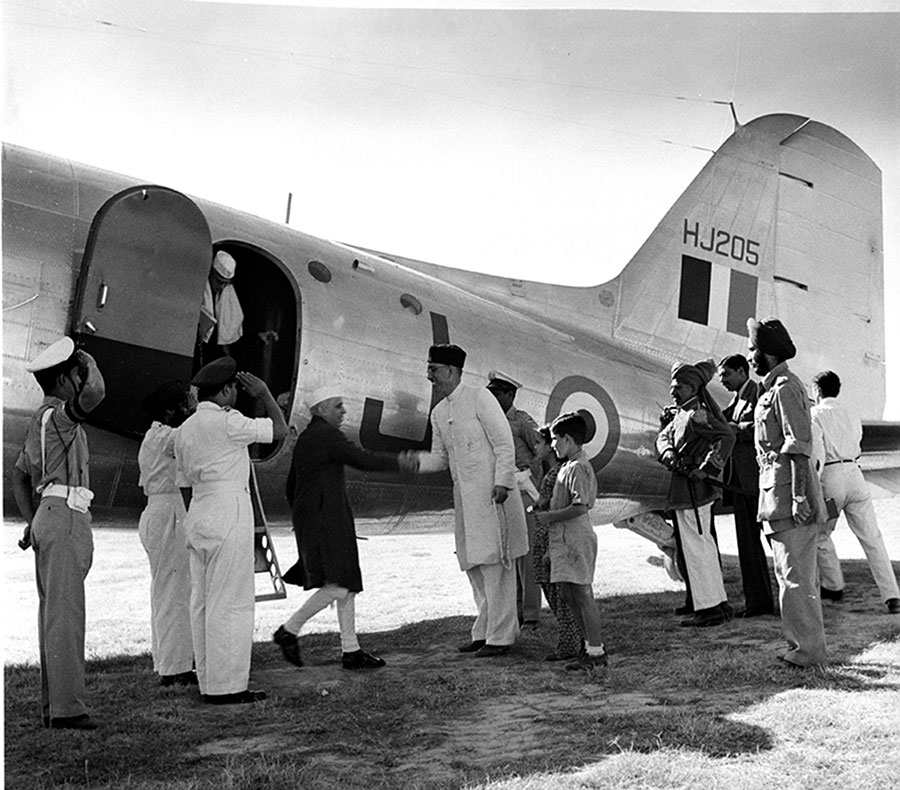
July 24, 1952
Nehru’s Statement in the Lok Sabha
“The question of citizenship arose obviously. Full citizenship applies there. But our friends from Kashmir were very apprehensive about one or two matters. For a long time past, in the Maharaja’s time, there had been laws there preventing any outsider, that is, any person from outside Kashmir, from acquiring or holding land in Kashmir. If I may mention it, in the old days the Maharaja was very much afraid of a large number of Englishmen coming and settling down there, because the climate is delectable, and acquiring property. So, although most of their rights were taken away from the Maharaja under the British rule, the Maharaja stuck to this that nobody from outside should acquire land there. And that continues. And in the state subject notification by the Maharaja, they have defined four grades of subjects. Class number one, class two, class three and class four. And unless you come in one of these classes, you cannot acquire land there, or any immovable property. So the present government of Kashmir is very anxious to preserve that right because they are afraid, and I think rightly afraid, that Kashmir would be overrun by people whose sale qualification might be the possession of too much money and nothing else, who might buy up, and get the dele3ctable places. Now they want to vary the old Maharaja’s laws to liberalize it, but nevertheless to have checks on the acquisition of land by persons from outside. So far as we are concerned, I agree that under Article 19, clause (5), of our constitution, we think it is clearly permissible both in regard to the existing law or any subsequent legislation. However, we agreed that this should be cleared up. The old state subject definition gave certain privileges regarding this acquisition of land, the services, and other minor things, I think, state scholarships and the rest. So, we agreed and noted this down:
The State Legislature shall have power to define and regulate the rights and privileges of the permanent residents of the state, more especially in regard to the acquisition of immoveable property, appointment to services and like matters. Till then, the existing State Law would apply.
Then there was another matter relating to citizenship, because owing to these troubles in Kashmir since 147, and a little before and after. There have been large number of people who have gone out of Kashmir but want to return. In fact, in our constitution, some provision has been made, and I might inform the House that this question was raised early this year or last year about the inclusion of a large number of migrants from East Bengal. We could not include them in our electoral rolls, because they came too late. We are including them now. Those that fulfill the conditions will all come in. So those, who had gone away from Kashmir into Pakistan or elsewhere, and who normally speaking might nit be eligible for citizenship, should be provided for, if they want to return. So we said;
Special Provision should be made in the laws governing citizenship for the return of those permanent residents of Jammu & Kashmir state, who went to Pakistan in connection with the disturbances of 1947 or earlier in fear of them, and could not return. If they return they should be entitled to the rights and privileges and obligations of citizenship.

August 7, 1952
Nehru’s Letter to Sheikh Abdullah
…Again, the State President is supposed to hold office during the pleasure of the President of India. What exactly does that mean? It has no meaning in the context of the resolution.
In the First Schedule, among the qualifications for the State President in that he should be a State Subject of Class 1. Thereby you are perpetuating in your constitution the various divisions of State Subjects and classes which were made many years ago, and which you said were out of date and were going to be revised…”
August 11, 1952
Sheikh’s Statement on Delhi Agreement in Assembly
“..It was agreed that in accordance with Article 5 of the Indian Constitution persons who have their domicile in Jammu & Kashmir State shall bête citizens of India. It was further agreed that the State legislature shall have powers to define and regulate the rights and privileges of the permanent residents of the state, more especially in regard to acquisition of immovable property, appointment to services and like matters. Till then the existing State law would apply. It was also agreed that special provision should be made in the laws governing citizenship to provide for the return of those permanent residents of Jammu & Kashmir State, who went to Pakistan in connection with the disturbances of 1947 or in fears of them as well as of those who had left for Pakistan earlier but could not return. If they returned, they should be entitled to the rights, and privileges and obligation of citizenship.
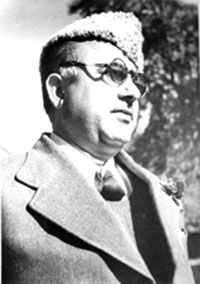
There are historic reasons which necessities such constitutional safeguards as the centuries past; the people of the State have been victims of exploitation at the hands of their well-to-do neighbours. The Hon’ble Members are perhaps aware that in the late twenties, the people of Jammu & Kashmiri agitated for the protection of their bona fide rights against the superior competing interests of the non residents of the state. It was in response to this popular demand that the Government of the day promulgated a Notification in 1927 by which a strict definition of the term ‘State Subject’ was provided. I am glad to say that the government of India appreciated the need for such a safeguard. No definition of the Special rights and privileges of the residents of the State can afford to remain static. The need may arise at one stage or the other to liberalize such a definition. The importance of the fact that State Legislature shall retain powers to be able to effect such modifications become obvious in this context.
There is yet another class of state subjects whose interests had to be safeguarded. The Hon’ble Members of this Hose are aware that on account of disturbances of 1947 and also as a consequence of the invasion of this country by Pakistan, large number of the residents of the State suffered dislocation. We have, therefore, to visualize, the possibility of their return to their homes and hearths as soon as normal conditions are restored. It has been suggested in certain quarters that this protection has been provided only for those residents of the State who are at present stranded in Pakistan. I would like to make it clear, as I have stated earlier, that the protection will operate only when the conditions are normal and such conditions naturally presume that the resettlement o the dislocated population, whether Muslims or non-Muslims, can not be one-sided or unilateral.”
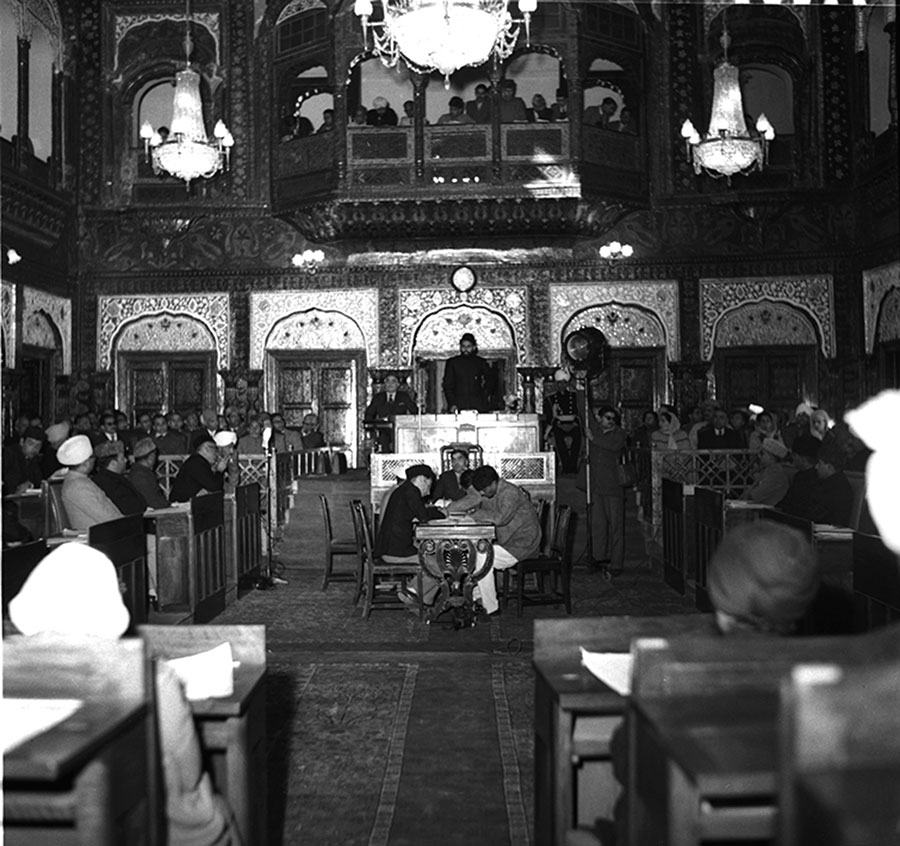
February 3, 1954
Report of the Basic Principles Committee
The Advisory Committee on Fundamental Rights and Citizenship was set up by the resolution of he Constituent Assembly dated 7th November, 1951, in order to make recommendations as regards qualifications required for Citizenship and the determination of Fundamental Rights of the residents of the state. The Committee was reconstituted by the Constituent Assembly by its resolution dated 20th October, 1953.
The state having acceded to the Union of India, every State Subjects and every person having his domicile in the State is a Citizen of India under the provisions of the Constitution of India. It is, however, recognized by the Government of India that this position would not affect the existing State Subject definition. While the committee adheres to principle underlying the definition, it feels that the definition should be liberalized in keeping with the changed times. The Committee therefore recommends that all the three classes of State Subjects provided in the definition be removed and a uniform class of permanent resident be established. Accordingly every person residing in the State who is a State Subject of Class I or Class II or who after having acquired immovable property in the State has been ordinarily residing there for a period of not less than ten years prior to the date of enforcement of the provision shall be a permanent resident of the State.
The power of the State Legislature to define ‘Permanent residents of the State’ in future in any manner it deems fit and to regulate the special rights and privileges of the permanent Residents of the State should be preserved. A majority of not less than two-thirds of the total membership of the House shall be necessary for the exercise of this power. The Committee is of the opinion that while adequate provisions to this effect should be incorporated at an appropriate place in the Constitution of India the provisions of Part II of the Constitution of India relating to Citizenship should be made applicable to the State and care should be taken to protect the special position accorded to the State Subjects to be now known as ‘Permanent resident of the State’ and their special rights and privileges. Necessary modification shall also have to be provided in that Part to enable those subjects of the State who had migrated to Pakistan in 1947 in connection with the disturbances or in fear of the same to return to the State under a Permit for resettlement of permanent return issued under the authority of law that would be made by the state legislature in due course.
The Committee is of the view that the state legislature should also be competent to make provisions with respect to acquisition and determination of the status of permanent residents of the state and until the state legislature enacts provisions in that behalf, the existing Ijazatnama rules should continue to remain in force and the existing procedure for obtaining a State Subject Certificate would apply for the purpose if securing a certificate as to the status of a permanent resident.

February 15, 1954
Assembly Gives Concurrence to the Application of the Constitution of India
“Mr Girdari Lal Dogra: Sir, I beg to move the following resolution.
Resolution that (a) having adopted the Report of the Drafting Committee this day, the 15th February, 1954; and (b) having thus given its concurrence to the Application of the Provisions of the Constitution of India in the annexure to the aforesaid Report.
The Assembly authorizes that government of the State to forward a copy of the said annexure to the government of India for appropriate action.
Sir, It is essential that the report of the Drafting Committee which the House has passed just now should begot incorporate in the Indian Constitution. In this connection, the President of India may possibly issued a decree under Article 4570. The recommendation shall become part of the Indian Constitution according to the provisions of his decree.
Sir, what I mean to say is that the Indian people have produced men like Gandhi and Nehru (cheers). They got their constitution framed by their own representatives. They did not adopt any foreign constitution. Sir, this is the guarantee for the finality of our accession. To protect the rights of our people it is essential that these recommendations be sent to the Government of India for incorporating them in the Indian Constitution. With these words, Sir, I move the resolution in the House.
Mr President, Resolved that;
Having adopted the Report of the drafting Committee, this day, the 15th February 1954 and (b) having thus given its concurrence to the application of the provisions of the Constitution of India, in the manner in dictated in the annexure to the aforesaid report, this assembly authorizes the Government of the State to forward the copy of the said annexure to the Government of India for appropriate action.
The resolution was adopted unanimously.



